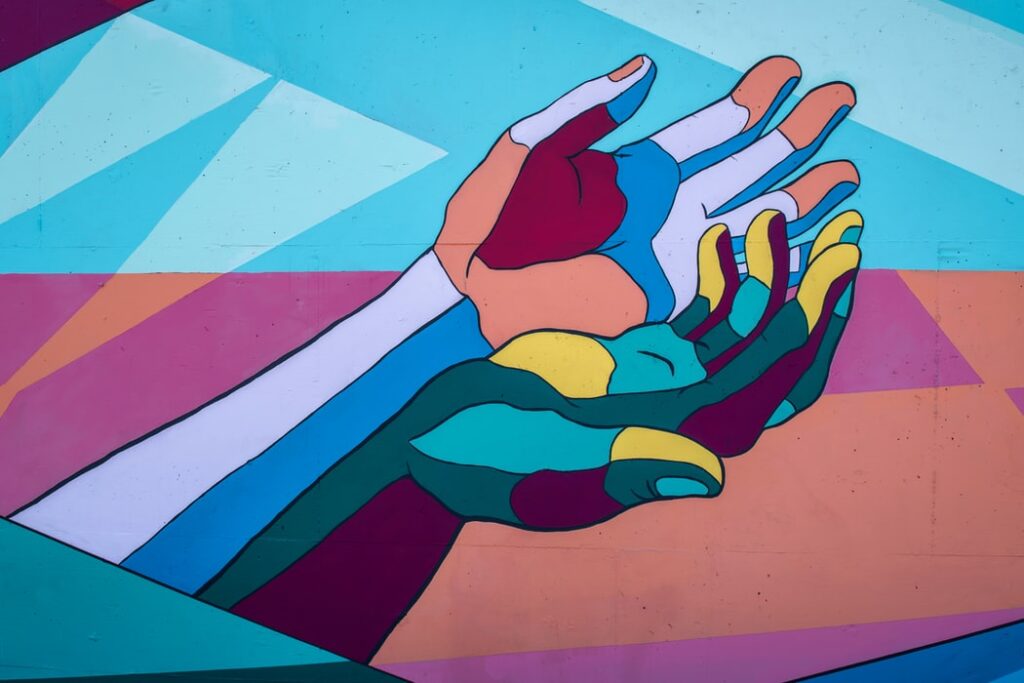
A sign at a recent protest said, “If you’re not acting to end racism, you’re part of the problem.” I agree. Racism will decrease in our country only as the voices that speak out against it increase. I’ve used this blog to show how the roots of racism lie deep in our distorted sense of identity that leads us to see others as less than ourselves in order to prop up our own self-worth. It’s a sickness, a disease and we must all speak out and work to end it on all levels.
There is an assumption underlying this sentiment, however, that should trouble us as followers of Jesus. It is the implied line that is being drawn between those who are working to solve the problem and those who remain ‘the problem’. There is an inherent self-righteousness in any charge that states, ‘we have it right and you have it wrong’. By seeing others as ‘the problem’ we exonerate ourselves from the requirement to change if the problem is to be solved. In our self-assurance we believe there is nothing required of us. We have it right. We are the solution. We have it figured out.
Jesus didn’t see it that way, nor did He allow His followers to see it that way. This is not to say that Jesus did not draw a clear line between good and evil, but we must recognize and take seriously how often He located that line within each human heart and not somewhere ‘out there’. On judging others, He challenged His followers to pay attention to the plank in their own eye before condemning the speck in their neighbor’s. (Matthew 7:3-5) He stood by the woman caught in adultery and challenged her accusers saying, ‘Let any one of you who is without sin be the first to throw a stone at her.” (John 8:7) A theme woven throughout the Gospels is Jesus’ call to personal and community repentance before judging the conduct of others.
This theme goes beyond the teachings of Jesus. The Apostle Paul reminds us, “For we have already charged that all, both Jews and Greeks, are under sin, as it is written: ‘None is righteous, no, not one; no one understands; no one seeks for God. All have turned aside; together they have become worthless; no one does good, not even one…for all have sinned and fall short of the glory of God.’” (Romans 3:9-12,23) The Apostle John writes, “If we say we have no sin, we deceive ourselves, and the truth is not in us. If we confess our sins, he is faithful and just to forgive us our sins and to cleanse us from all unrighteousness. If we say we have not sinned, we make him a liar, and his word is not in us.” (1 John 1:8-10)
What we see from Scripture is an ordering of priorities for God’s people; before you consider the line between good and evil that lies out there, between us and them, pay attention and deal with the line that runs inside of your own spirit. This is what it means to steward your identity. We are first and foremost children of God, redeemed and loved and called to serve our neighbor. If we steward that identity, we will not tolerate any sense of self-righteousness to creep in.
In his classic Gulag Archipelago, Aleksandr Solzhenitsyn wrote, “The line separating good and evil passes not through states, nor between classes, nor between political parties either – but right through every human heart.”
A great lie of the Enemy is convincing us that the solution to the problems we face can only be found when ‘they’ change. When all the lines between right and wrong lie ‘out there’, when we find ourselves consistently on the ‘right side’, we close ourselves off to the work that each of us needs to do in our own heart. If we don’t believe we need grace, we will not be gracious. If we don’t need forgiveness, we will not forgive. If we don’t pray first for our own healing, we can never be used by God to bring healing to others. If we say that we have no sin, the truth is not in us.
If our country is to heal, I suggest God’s people need to start praying that God would root out racism in every human heart, and that He would start with us, with me. When all of us, regardless of our race, politics or history can pray that prayer as one, we can claim God’s promise that when His people humble themselves and pray and seek His face and turn from their wicked ways, then He will hear from heaven, and forgive our sins and heal our land. (2 Chronicles 7:14)
An old hymn says, “Let there be peace on earth, and let it begin with me.” Perhaps we can rewrite our protest banners to read something similar, “We’re all part of the problem, let’s unite and end racism together.”
Connect With Us
Connect with us and others in The Center for Steward Leader Studies community to stay informed on activities and opportunities.
